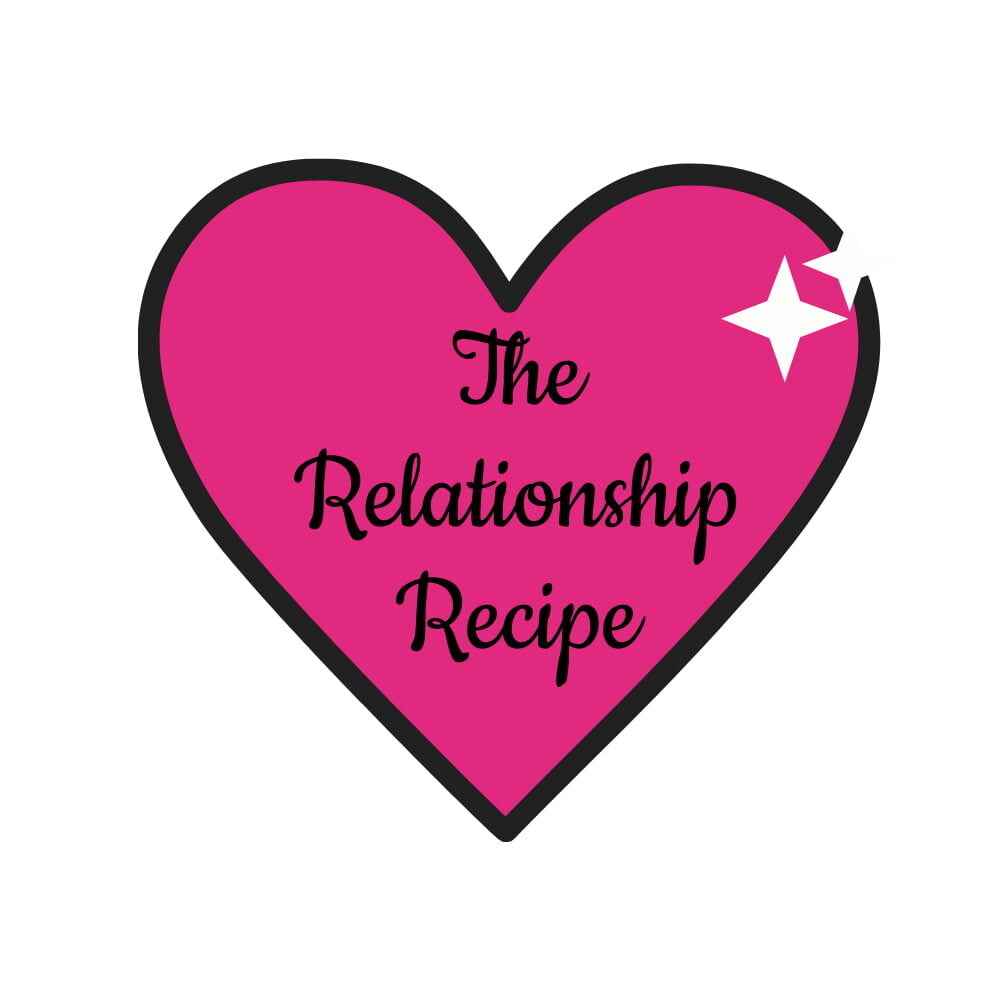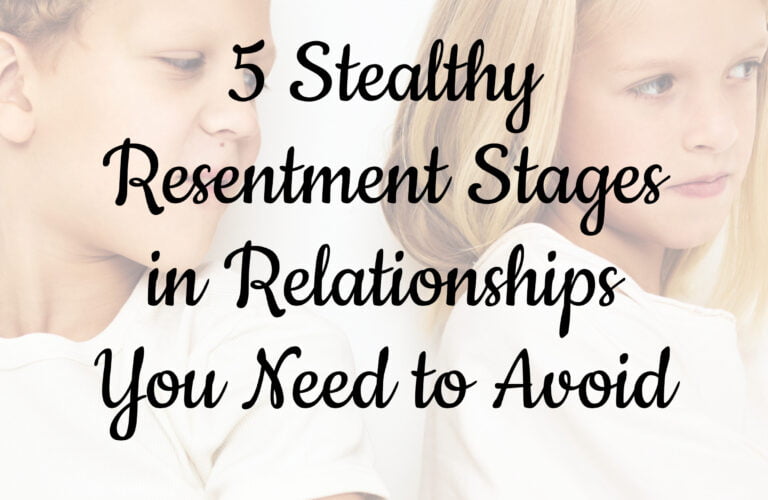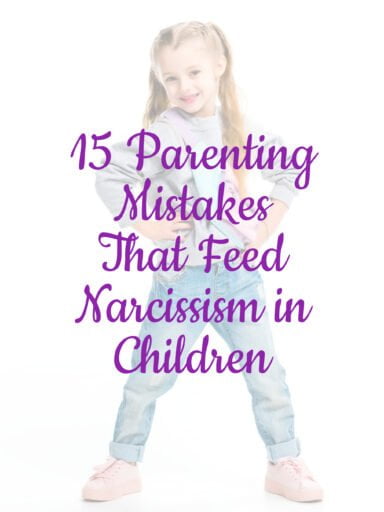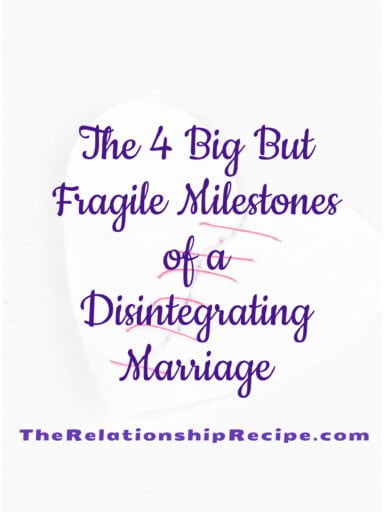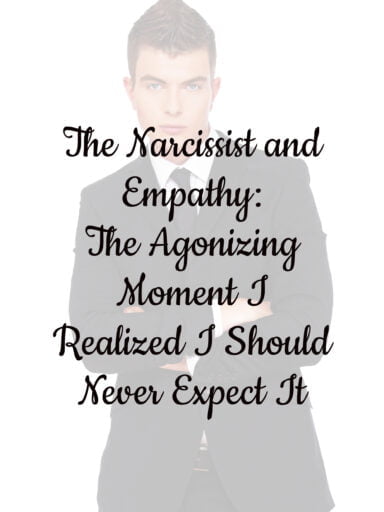Resentment.
That insidious, quiet little monster, responsible for nuking millions of relationships. Why is it so hard to get past?
My marriage is rife with these resentment stages. Every. Single. One. Of them. It’s to the point where I don’t speak to my spouse unless necessary.
Nearly every interaction we have with each other is a negative one. No, we aren’t screaming and throwing plates across the room. We are well past that “passionate” stage of fighting and make up sex. That ship sailed a long time ago.
At first, it was a relief. The quiet was nice, but something was different. Although it was quieter, I can’t honestly say it felt more peaceful. I am boiling inside even when he’s not home.
I’ve tried to push out the negative thoughts of him with something positive about him.
Doesn’t work for long because there isn’t enough time in between the stages of resentment for me to heal from my anger for the last one.
Hell of a way to live, but that is where I’m at now.
What Causes Resentment in Relationships?
The root causes of resentment in relationships often arise from various sources, such as unmet expectations, where partners may feel let down or disappointed when their needs or desires aren’t fulfilled.
Communication breakdowns can also fuel resentment, as misunderstandings or unexpressed feelings can build over time. Additionally, feeling undervalued or unappreciated by a partner can breed resentment, leading to feelings of neglect or insignificance.
Unresolved conflicts, whether stemming from past arguments or ongoing disagreements, can contribute to simmering resentment if not addressed constructively. Repeated disappointments or betrayals can erode trust and breed resentment, making it challenging to maintain a healthy relationship.
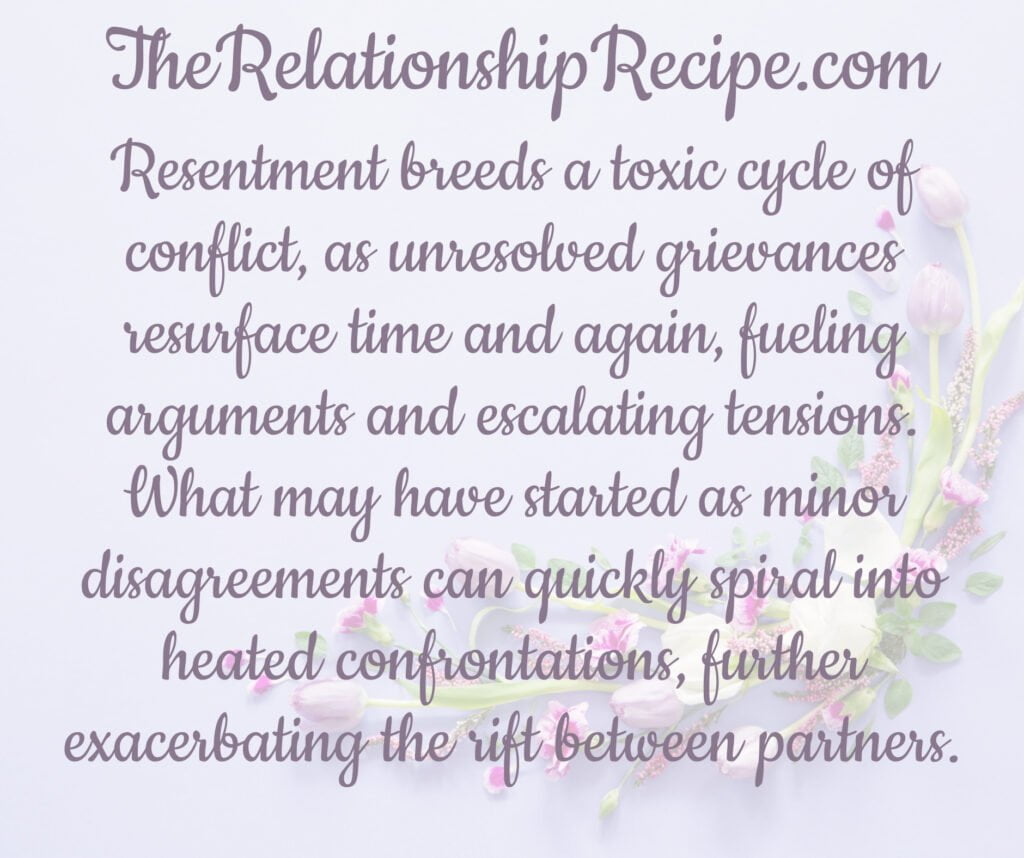
What are the Resentment Stages in Relationships?
Stages of Resentment in an intimate relationship typically evolves through these 5 steps:
- Discomfort or Displeasure:
Initial feelings of discomfort or displeasure arise due to perceived unfairness, unmet needs, or unresolved conflicts within the relationship. Let’s face it, discomfort and displeasure aren’t feelings anyone likes to experience. However, these unpleasant sensations are our mind and body’s way of telling you something isn’t right.
We will do a LOT to get rid of the feeling. Maybe by talking about it, confrontation, or lashing out at our partner. This usually happens at the beginning, passionate stages in a newer relationship. However, some relationships never grow past this point.
2. Suppressed Emotions:
Rather than expressing these feelings openly, one or both partners may suppress emotions to avoid conflict or maintain harmony in the relationship.
Most of us will do anything for peace in our lives, sometimes at the expense of communicating how we feel to our partner because of many things:
Maybe we fear how they will react.
Maybe we fear they won’t react at all.
Maybe we fear how WE will react if we start talking about it. When you keep the anger and issues to yourself, the potential for a blow up increases exponentially.
3. Building Resentment:
Over time, unaddressed issues and suppressed emotions build up, leading to a growing sense of resentment toward the partner.
You’ve been together for quite a while now. You are well past the honeymoon period and the day-to-day piss-offs increase. Likewise, you’ve asked them to load the dishwasher properly, or to please put the damn toilet seat down.
Nicely.
They still won’t do it. Why??? It’s not as if we’re asking for the moon and stars.
4. Negative Interpretation:
The affected partner may begin to interpret their partner’s actions or behaviors negatively, attributing malicious intent or neglect to their actions.
This stage is dangerous. Paranoia starts to creep in. You’ve cussed and discussed, cried, screamed, maybe threw things in frustration because these same issues continue to marinate within the relationship.
Now, you may start to wonder what their real intentions are. Are they trying to drive me crazy? They can’t possibly be this dense! It’s a toilet seat, — just put it down! What is so difficult about this?? Issues of this kind may stem from a passive-aggressive place, or from a place of “learned helplessness.”
5. Emotional Distance:
Resentment often leads to emotional distance and disconnection between partners as trust and intimacy erode.
This is the last of the resentment stages within a relationship. You threw in the towel and gave up because nothing seems to work. In the name of peace, we decide it’s easier to keep our mouth shut about it. Nothing gets solved, and it’s just easier to simmer in silence.
This doesn’t help matters, but if it feels like it makes life more bearable-even if the relationship is at the risk of getting a divorce.
Your partner may be feeling some relief as well, but not for the same reasons you might. They may be thinking, “Ahhh. Finally, we have reached a stage where we are past all the bickering! Maybe we have turned the corner, and things are going to be smooth sailing now!” In reality, that’s not the case.
If your partner is not coherent or caring enough to help out by putting the toilet seat down, for example, they sure as hell won’t be noticing it when you go quiet. Or, if they do, it’s unlikely they will mention it. Might as well not upset the apple cart!
This is where walkaway wife syndrome usually enters the picture. After begging and crying for change — for years — the requests fall on deaf ears time and time again. Of course the other spouse may not even notice the sudden silence, then they will be shocked! Shocked, I tell you, when she leaves…because, you know-everything was going “so well.”
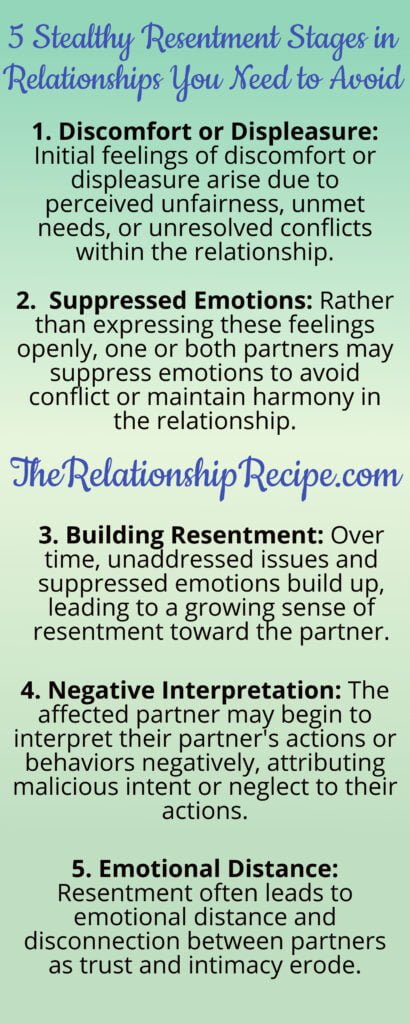
Expression of Resentment in Relationships
Eventually, the accumulated stages of resentment may manifest in passive-aggressive behavior, criticism, or conflict within the relationship.
Certainly, the expression of resentment in relationships can take various forms, often reflecting the underlying feelings of frustration, disappointment, or hurt.
For example, a partner who feels resentful about their significant other’s lack of help with household chores may start exhibiting passive-aggressive behavior, such as deliberately procrastinating or performing tasks poorly. This is a way to express their discontent without directly addressing the issue.
Similarly, if one partner harbors resentment towards the other for consistently dismissing their opinions or ideas, they might resort to criticism during discussions or arguments, pointing out flaws or mistakes as a way to retaliate for feeling undervalued.
In some cases, unresolved resentment in relationships can lead to frequent conflicts, as pent-up emotions spill over into heated arguments or disagreements over seemingly trivial matters. For instance, if a partner feels resentful about their significant other’s lack of emotional support during a challenging time, they may lash out during unrelated discussions, using past grievances as ammunition to escalate the conflict.
Overall, the expression of resentment often serves as a manifestation of deeper relational issues, highlighting the importance of addressing underlying concerns and open communication to resolve conflicts and rebuild trust within the relationship.
Impact of Resentment in Relationships
Resentment in relationships can have a significant impact on the overall health and stability of the relationship, leading to communication breakdowns, increased conflict, and ultimately, relationship dissatisfaction or dissolution if not addressed.
Stages of resentment, left unchecked, permeates every aspect of a relationship, corroding its foundation and eroding the bonds of trust and intimacy. The impact of resentment is multifaceted, seeping into communication dynamics and distorting perceptions of each other’s actions and intentions.
Communication breakdowns typically arise as resentment festers, with partners withdrawing emotionally or resorting to passive-aggressive tactics rather than engaging in honest and constructive dialogue.
As a result, meaningful conversations become scarce, replaced by a simmering tension that stifles genuine connection and understanding.
Resentment breeds a toxic cycle of conflict, as unresolved grievances resurface time and again, fueling arguments and escalating tensions. What may have started as minor disagreements can quickly spiral into heated confrontations, further exacerbating the rift between partners.
Ultimately, the cumulative effect of resentment can lead to profound dissatisfaction with the relationship, as partners become disillusioned with their inability to address underlying issues and find resolution.
Left unaddressed, resentment may ultimately culminate in the dissolution of the relationship, as the emotional distance and bitterness become too great to overcome.
Conclusion
The presence of resentment in relationships is a warning sign that demands attention and proactive measures. Ignoring or suppressing resentment only allows it to fester, corroding the foundation of trust and intimacy upon which healthy relationships thrive.
By acknowledging and addressing resentment head-on, couples can cultivate open communication, empathy, and work collaboratively to rebuild trust and strengthen their bond. Through commitment to mutual respect, understanding, and forgiveness, you can navigate the challenges posed by resentment and emerge stronger, with a deeper appreciation for the resilience of your relationship.
https://www.webmd.com/mental-health/signs-resentment
This post may contain affiliate links. I earn from qualifying Amazon purchases at no extra cost to you.
